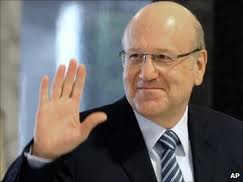 IN THEORY Lebanon is an independent republic and in theory a democracy, which in theory rests upon a fair division of spoils between some 17 officially recognised religious “sects”. As long as everyone suspends disbelief, the tiny country and its enterprising people thrive. But then reality comes knocking. In 1975 it came in the form of a 15-year-long civil war that left Lebanon shattered and let its neighbours, Syria and Israel, stomp in with their armies.
IN THEORY Lebanon is an independent republic and in theory a democracy, which in theory rests upon a fair division of spoils between some 17 officially recognised religious “sects”. As long as everyone suspends disbelief, the tiny country and its enterprising people thrive. But then reality comes knocking. In 1975 it came in the form of a 15-year-long civil war that left Lebanon shattered and let its neighbours, Syria and Israel, stomp in with their armies.
That storm passed but the stomping has renewed of late, in the form of hundreds of thousands of refugees fleeing Syria’s civil war. Lebanon managed, just, to maintain a pretence of aloofness from that imbroglio, despite a bitter polarisation among the Lebanese between supporters and foes of the beleaguered regime of Syria’s Bashar Assad. But the resignation of Lebanon’s prime minister, Najib Mikati, on March 22nd has abruptly ended that pretence.
Under Lebanese rules the prime minister must be a Sunni, the president a Maronite Christian, and parliament’s speaker a Shia. The reality is that Lebanon’s Shias, bolstered by the might of Hizbullah, their main party-cum-militia, have in recent years emerged as the strongest force. Prodded by Iran, Hizbullah backs Mr Assad to the hilt. Lebanon’s unruly Christians are divided, half aligned with Hizbullah, while the geographically dispersed Sunnis, whose hold on key parts of the Lebanese state has been slipping, cheer instead for Syria’s rebels.
Mr Mikati’s installation as prime minister two years ago was the outcome of a long period of manoeuvring by Mr Assad’s allies, led by Hizbullah and marked by serial assassinations, eventually forcing the resignation of his predecessor. Mr Mikati, a telecoms magnate, was seen as a competent, relatively neutral figure, but his position as the ostensible top Sunni was fragile. Along with Lebanon’s president, Michel Suleiman, he has tried to hold the balance between the country’s many sectarian interests. For instance, whereas Lebanon’s army is seen as closer to Christians and Shias, its internal security forces have tended to be Sunni-dominated.
As Mr Assad has weakened, Hizbullah has felt increasingly threatened, while Sunni rage has grown. With Lebanese elections scheduled for June, Mr Mikati found himself parrying demands that were sure to alienate his Sunni constituents. Hizbullah’s camp insisted on changing electoral rules to its advantage and on replacing the chief of Lebanon’s internal security, a powerful Sunni due soon to retire, with a more malleable figure. Increasingly frequent clashes between Sunni militants and pro-Syrian gunmen underlined the hazard, in Mr Mikati’s eyes, of tampering with Lebanon’s tenuous arrangements. His resignation increases this danger.
THe Economist

Leave a Reply
You must be logged in to post a comment.